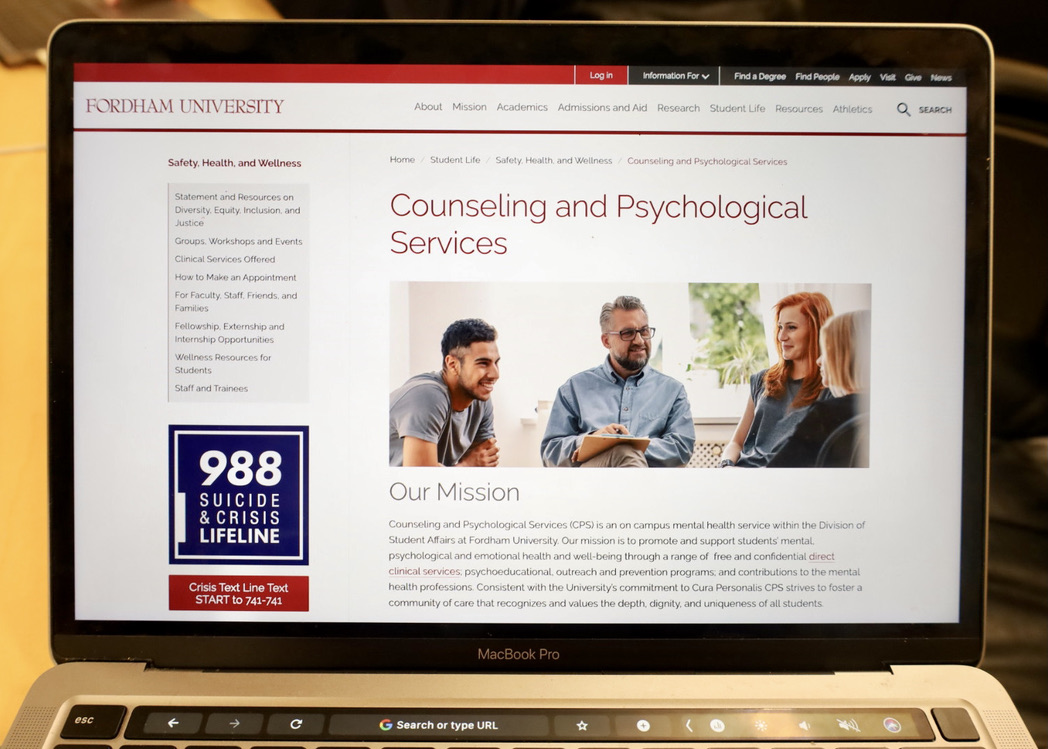As the spring semester hits its halfway point and midterms return to the front of students’ minds, taking care of one’s mental health is more important than ever. Counseling and Psychological Services (CPS), Fordham University’s on-campus mental health service, helps ensure mental health support for students living on and off campus.
Jeffrey Ng, director of CPS, highlights mental health support as both a CPS and a community concern.
“We don’t consider our office to be the only one that supports our students’ mental health,” Ng said. “We believe that everyone at the university plays a role in supporting students’ mental health and wellbeing.”
CPS’ equity-based approach acknowledges the unique backgrounds and experiences of each student in the community.
Ng explains how there are instances in which a student is referred to off-campus providers who may be better equipped for their specialized care. However, in the case of an off-campus referral, CPS assists students with the transition to a new provider. He also added that while CPS does not provide direct services over the weekend or in the overnight hours, the university has procedures in place to support students if an issue is urgent or imminently concerning.
“We also promote the National Suicide Prevention Lifeline and the Crisis Text Line, which is available 24/7 for students,” he said. The Crisis Text Line is also promoted on CPS’ website.
CPS’ walk-in appointments are available from 9 a.m. to 7 p.m. Monday through Thursday and 9 a.m. to 5 p.m. on Friday for students experiencing crises or urgent concerns.
There are three types of individual counseling: brief counseling (approximately 5 weeks) for adjustment or temporary stressors, semester-long short-term counseling for persistent and ongoing concerns like depression or anxiety and extended counseling beyond one semester for students with ongoing concerns who cannot access off-campus resources.
In addition to one-on-one care, the new addition of peer counseling can help students with adjustment concerns such as transitioning to college, stress management, loneliness and relationship problems. There are currently eight counselors at Rose Hill and one at Lincoln Center. Program feedback has been positive so far.
“The students who have utilized peer counseling have had a very positive experience with their sessions,” said Ng. “The only thing that we may have to tweak is that we may have recruited too many peer counselors this year!”
Group counseling is also an option for students who may benefit from a weekly support group to connect with over shared identities or mental health concerns. Groups for students of color, graduate students and stress management are among some of the topics covered in each respective support group.
“We have group coordinators on each campus that, at the beginning of every academic year, will start strategizing on what types of groups to offer,” Ng said. “Between gauging student interest and student and staff availability, we narrow it down to offering between eight or 10 groups a year across both campuses. We may pivot or shift throughout the year based on how the groups are going.”
CPS also provides consultations, which are appointments with different members of the Fordham community who may be concerned about a student’s wellbeing.
“It could be a professor, a parent, a student concerned about another student,” Ng said. “If someone isn’t trained they may not always know what might be going on with a student of concern or how to approach that student. These folks can consult with us about how to best support students of concern.”
Mental health support as a campus-wide effort is prioritized through the various events held around the Fordham community. CPS partners with numerous other offices, student clubs and residential life to spread the word about the office and their resources.
Maria Rosario, FCRH ’24, a peer counselor, has found the available resources helpful and has positive feedback about the peer counseling program. She explains peer counseling as an option for those who may be intimidated about going to a professional, and, as students, peer counselors can be on the same level as someone who may be going through similar experiences and empathize with them.
“You’re trying to help them analyze how they’re feeling, what they’re thinking about and possibly the next steps,” said Rosario. “Recommending them to resources like their Resident Assistant or other places that can help like Campus Ministry or certain clubs — things that encourage community and match up with what we’ve been talking about.”
One finding that Rosario notes from outreach events is that students often referenced outdated information about support resources.
“We’re definitely trying to get information out there and the right information,” she said. “It’s accessible, it’s free; you don’t have the limits that you used to have in the past.”









































































































































































































